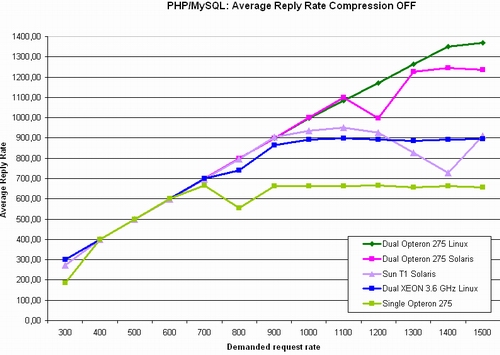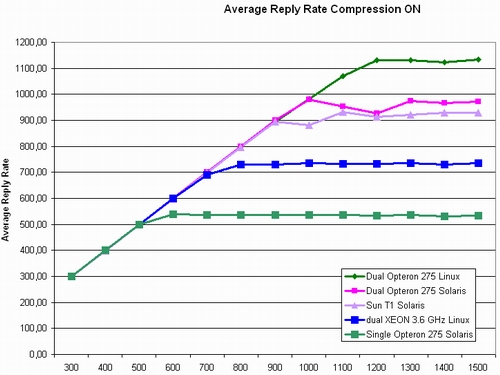Sun’s T2000 “Coolthreads” Server: First Impressions and Experiences
by Johan De Gelas on March 24, 2006 12:05 AM EST- Posted in
- IT Computing
The T2000 as a heavy SAMP web server: the results
To interpret the graphs below precisely, you must know that the x-axis gives you the number of demanded requests, and the y-axis gives you the actual reply rate of the server. So, the first points all show the same performance for each server, as each server is capable of responding fast enough.
We tested the Opteron machines with both Linux on Solaris to get an idea of the impact of the OS.
The Sun T2000 isn't capable of beating our Quad core Opteron, but there are few remarks that I should make.
First of all, we tested the 1 GHz T1, which is, of course, about 20% slower than the best T1 at 1.2 GHz. The T2000 peaked at 950 req/s, the quad core Opteron at 1368 (Linux) and 1244 (Solaris) req/s. However, the T2000 was capable of delivering 935 req/s without any error (request timeout) while the Quad Opteron delivered 1100 (Solaris) and 1250 (linux) req/s without any errors. So, given the criteria that there cannot be any time-out, the difference gets a little bit smaller.
In defense of the Opteron and Xeon: the average response time for one particular request was (most of the time) between 5 and 15 ms. Once the server came close to its saturation point, we noted a maximum of 70 ms. With the T2000, the response time was at least 20 ms, typically 40 ms, with peaks of up to 220 ms when we came close to the peak throughput.
Of course, this is the disadvantage of the lower single-threaded performance of this server CPU: the individual response times are higher. In case of OLTP and web server, this is hardly a concern; in case of a decision support system, it might be one.
There is a better way to do this test, of course: enable the mod_deflate module and get some decent gzip compression. Once we enabled compression, our network I/O, which peaked at up to 12 MB/s, came down to a peak network I/O of 1.8 MB/s. Let us see the next benchmark, where we measured with gzip compression on.
The Sun T1 starts to show what it can do: performance has hardly decreased. Gzip compression is almost free on the T1; compression lowers performance by only 2%. The Opteron sees its performance lowered by 21% (977 vs 1244), and the Xeon by 19% (730 vs 899).
On Solaris, the T1 performs like a quad Opteron. Linux, which has probably slightly better drivers for our Opteron server, gives the quad Opteron the edge.
Let analyse this a little further.
As you can see, our application should be a prime example of an application where multi-core server CPU feels at home. With Gzip compression enabled, performance is still almost perfect at 96% going from 4 to 8 T1 cores.
So, why aren't we seeing the performance that the Sun claims regarding, for example, Spec Web2005, where the T1 has no problem outperforming quad core x86 CPUs? We are not sure, as we measured that 97% of the processing was done in the OS code (97% "system") and only 2-3% of the CPU load was done in the actual application ("user"). We suspect that the relatively light load of FP operations might have lowered the T1's performance. Depending on the tool that we used, we saw 0.66 to 1% of FP operations in our instruction mix, with peaks to 2.4%. Those FP operations are a result of our script calculating averages most likely.
To interpret the graphs below precisely, you must know that the x-axis gives you the number of demanded requests, and the y-axis gives you the actual reply rate of the server. So, the first points all show the same performance for each server, as each server is capable of responding fast enough.
We tested the Opteron machines with both Linux on Solaris to get an idea of the impact of the OS.
The Sun T2000 isn't capable of beating our Quad core Opteron, but there are few remarks that I should make.
First of all, we tested the 1 GHz T1, which is, of course, about 20% slower than the best T1 at 1.2 GHz. The T2000 peaked at 950 req/s, the quad core Opteron at 1368 (Linux) and 1244 (Solaris) req/s. However, the T2000 was capable of delivering 935 req/s without any error (request timeout) while the Quad Opteron delivered 1100 (Solaris) and 1250 (linux) req/s without any errors. So, given the criteria that there cannot be any time-out, the difference gets a little bit smaller.
In defense of the Opteron and Xeon: the average response time for one particular request was (most of the time) between 5 and 15 ms. Once the server came close to its saturation point, we noted a maximum of 70 ms. With the T2000, the response time was at least 20 ms, typically 40 ms, with peaks of up to 220 ms when we came close to the peak throughput.
Of course, this is the disadvantage of the lower single-threaded performance of this server CPU: the individual response times are higher. In case of OLTP and web server, this is hardly a concern; in case of a decision support system, it might be one.
There is a better way to do this test, of course: enable the mod_deflate module and get some decent gzip compression. Once we enabled compression, our network I/O, which peaked at up to 12 MB/s, came down to a peak network I/O of 1.8 MB/s. Let us see the next benchmark, where we measured with gzip compression on.
The Sun T1 starts to show what it can do: performance has hardly decreased. Gzip compression is almost free on the T1; compression lowers performance by only 2%. The Opteron sees its performance lowered by 21% (977 vs 1244), and the Xeon by 19% (730 vs 899).
On Solaris, the T1 performs like a quad Opteron. Linux, which has probably slightly better drivers for our Opteron server, gives the quad Opteron the edge.
Let analyse this a little further.
| PHP/MySQL No Gzip | |||
| Single Opteron 275 | 665 | 4-core T1 | 535 |
| Dual Opteron 275 | 1244 | 8-core T1 | 949 |
| Scaling 2 Opteron cores to 4: | 87% | Scaling 4 to 8 T1 cores: | 77% |
| PHP/MySQL Gzip | |||
| Single Opteron 275 | 538 | 4-core T1 | 477 |
| Dual Opteron 275 | 977 | 8-core T1 | 933 |
| Scaling 2 Opteron cores to 4: | 82% | Scaling 4 to 8 T1 cores: | 96% |
| Gzip performance vs no Gzip | |||
| Opteron 275 | 79% | Sparc T1 | 98% |
As you can see, our application should be a prime example of an application where multi-core server CPU feels at home. With Gzip compression enabled, performance is still almost perfect at 96% going from 4 to 8 T1 cores.
So, why aren't we seeing the performance that the Sun claims regarding, for example, Spec Web2005, where the T1 has no problem outperforming quad core x86 CPUs? We are not sure, as we measured that 97% of the processing was done in the OS code (97% "system") and only 2-3% of the CPU load was done in the actual application ("user"). We suspect that the relatively light load of FP operations might have lowered the T1's performance. Depending on the tool that we used, we saw 0.66 to 1% of FP operations in our instruction mix, with peaks to 2.4%. Those FP operations are a result of our script calculating averages most likely.












26 Comments
View All Comments
JackPack - Friday, March 24, 2006 - link
Pleasant to read as usual, Johan.BTW, are they letting you keep the T2000?
http://blogs.sun.com/roller/page/jonathan?entry=ni...">http://blogs.sun.com/roller/page/jonathan?entry=ni...
PandaBear - Friday, March 24, 2006 - link
In terms of Branded server it is a good price, but as benchmark have shown, a Dual Opteron running Linux both perform better and use less power. I think people who buy these class of server want support and service (and build quality) and in that case Sun certain would win the whitebox builder no matter how good a Dual Opteron is.Nonetheless it is a good product, for the one who demand this kind of quality. Now Intel's solution really looks bad.
Calin - Friday, March 24, 2006 - link
I don't know what you are talking about - if you would up the memory on the Opteron HE (2CPU of 2 cores) to 32GB, the power consumption would be almost the same (assuming 6W per 4GB of RAM, it would be at 234W. Close enough to be considered equal, I'd say.Also, wouldn't populating all the possible memory slots on the Opteron decrease a bit its performance? I don't know about Opteron, but Athlon64 decrease its command rate (Help, Johan! :) ) when working with all the memory channels filled.
I agree about the better performance of the Opteron server, but regarding the power use, it is the same as the Sun's recent offering. Maybe the introduction of the DDR2 Opterons would change the power envelope, but until then, the T1 might have some aces up its sleeve
JohanAnandtech - Friday, March 24, 2006 - link
You must calculate about 4-5 Watt per 2 GB Dimm. Based on the measurements I did and slightly guessing I think a 32 GB Opteron HE with 32 GB would definitely consume more than The T2000 as also have to count a few Watts per memory channel.Indeed, fully loaded DIMM channels will probably throttle back to lower speeds. I am not sure about Command rate though (BTW, it increases on the Athlon 64 not decreases :-), as it is possible less important with buffered DIMMs.
About performance, we still have to test a lot of scenario's (jsp, databases). The impression of the T2000 might still change.
Zoomer - Sunday, April 9, 2006 - link
2xx Opterons use rigistered ram, so its not an issue like with the 1xx 939s.Calin - Friday, March 24, 2006 - link
I just took the difference measured between the 2xOpteron HE with 4 and 8 GB or RAM (192 and 198W), shown in the table on the last page. I know that even rounding errors might change that between 4 and 8W, but anyway, Opterons won't use less power than the T1.Very interesting article, and I eagerly await for the sequels :D